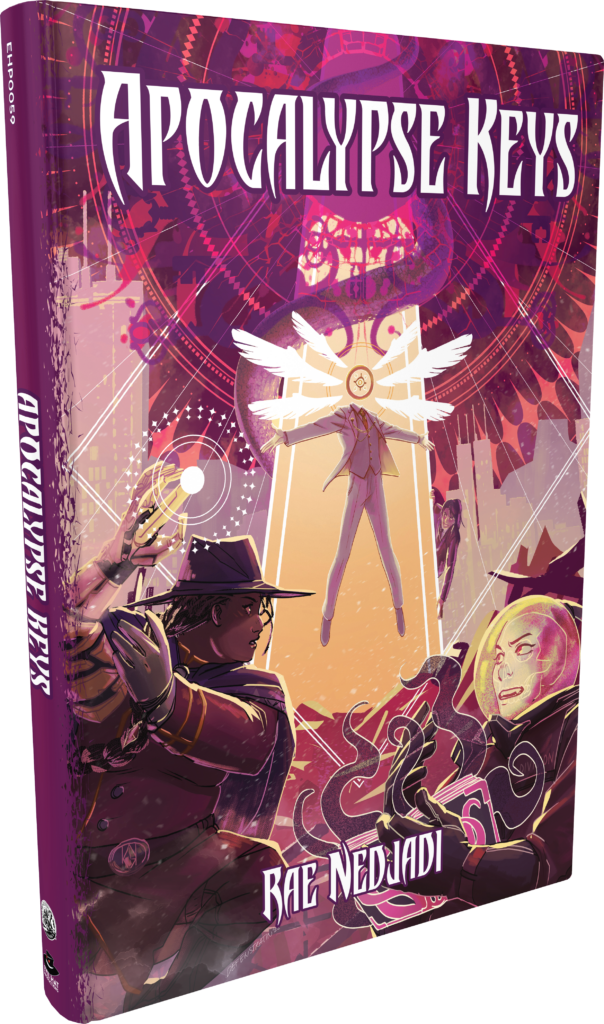A superweirdo is a main character in a story that follows a lot of the beats of a superhero story like secret identities, Fortresses of Solitude, saving the world but is not the usual masked billionaire or last son of a dying planet. Think of stories like Hellboy, Umbrella Academy or Doom Patrol where the main character struggles to make human connections and resist the desire to become full-on villains because of their massive power. These are the types of stories told by Apocalypse Keys, a Powered by the Apocalypse game created by Rae Nedjadi. Evil Hat Productions recently sent a review copy for me to peruse. How does this game stand out? Let’s play to find out.
Apocalypse Keys tells the story of DIVISION, a secret government (?) agency whose purpose is to stop the end of the world as we know it, which is apparently happening more often than we know. To this end, it’s collected a team of powerful beings as Omen-class agents. Each of these agents could potentially end the world too, but the agency has found that by putting them together on a team and directing them at other Harbingers means they are less likely to end everything. And, on the off chance they do, there’s a whole bunch of powerful beings who can stop them that know all their strengths and weaknesses.
Players choose their playbook from one of several types of Harbinger. One of the organizational elements about the game that I liked is that the playbooks are sorted from simple to complex. If you just want to play, say, a half-demon that likes to brood and punch fellow demons, that’s one of the early playbooks. For something more complex, like a fallen god reckoning whether they want to accept their new mortality or blow up this imperfect world, that comes later. Not only do players choose the moves for their characters they also choose moves that reflect the resources DIVISON has on offer. These choices help to give the world an unusual flavor: sure there’s stuff like an advanced armory or access to a forbidden library, but what about an agency that keeps the ghosts of its dead agents on retainer?
Apocalypse Keys uses Powered By The Apocalypse as its chassis but it modifies a lot. Even the basic mechanic is changed to better suit the story it wants to tell. It keeps the basic structure of strong success/weak success/GM move but it flips the location of the successes. Rather than static modifiers, players acquire darkness tokens by acting in accordance with their playbook. When they make rolls, they spend the tokens to add to the roll. However, complicated successes come up as 11 or better, while solid success is 8-10. The complicated success is also usually expressed not as a failure or as a weak hit but as the character’s power overwhelming them to make things complicated. Sure, the psychic contacts the ghost they wanted but also riles up every specter within a two block radius.
The game also uses one of my favorite PbtA mechanics from the past few years. Players determine the truth behind the mysteries in a manner similar to Brindlewood Bay. There’s not a predetermined answer to the weirdness going on in an episode. They must put together the clues, make a roll and see whether their idea is correct or if the GM gets to twist it around. These clues often tie in with each player’s mysterious background. That cult might have been worshipping you at some point but now its turned to a new dread god. Can you wipe them out knowing that the first person you ever loved it at the altar behind the grotesque mask?
Many of these mechanics might be familiar to long time players of PbtA games but they’ve been modified and reimplimented here to fit the genre in a better way. This leads to the main criticism I have for Apocalypse Keys. Getting into the mainset of PbtA games can be a challenge for some folks. It may be the terminology or the narrative shift or a version that doesn’t explain its moves clearly. Getting the most out of this game seems like it would require players who are not only comfortable with this style of game but are interested in a version that changes up some of the most central mechanics. I like PbtA games because I think they can be very easy to teach to new people. This isn’t one of them. I would play Apocalypse Keys with people who are already comfortable with this style of game and start off newbie with something like Monster of the Week or Masks first.
For experienced PbtA gamers, Apocalypse Keys brings the massive power and massive feelings of superweirdos to the table.


